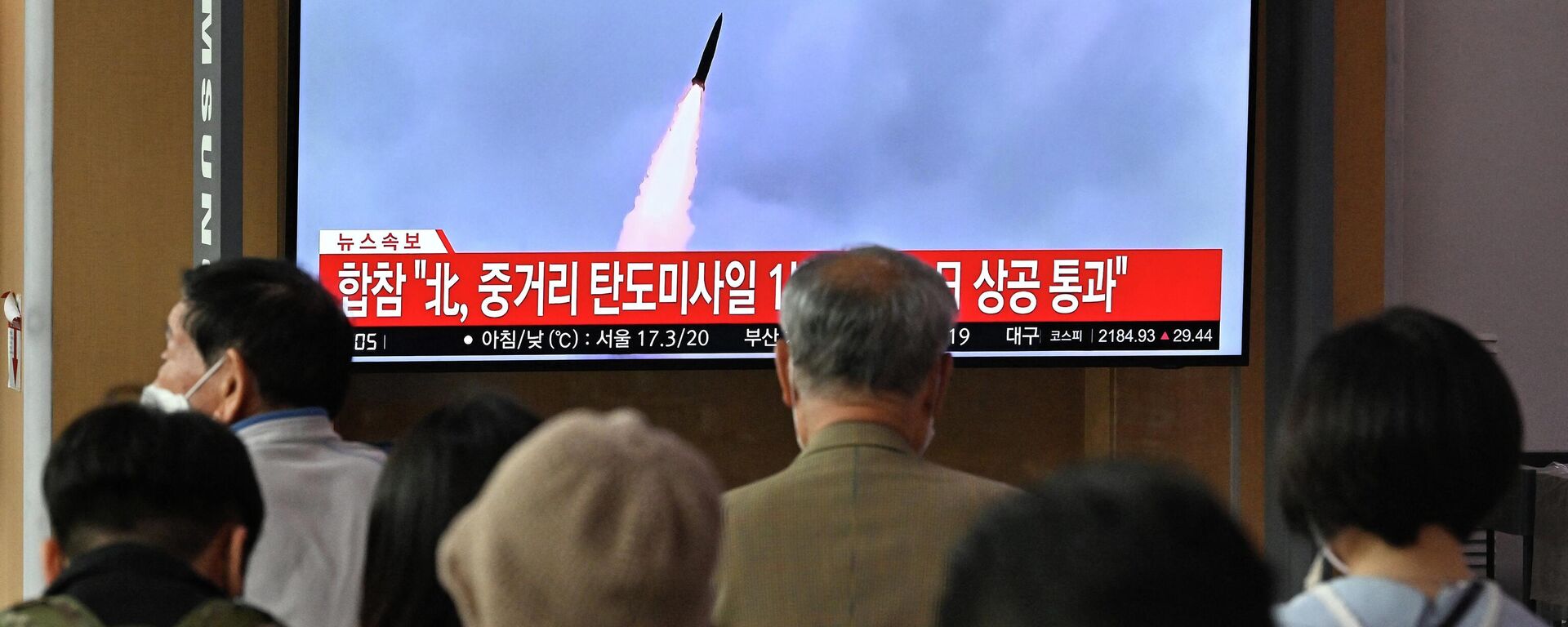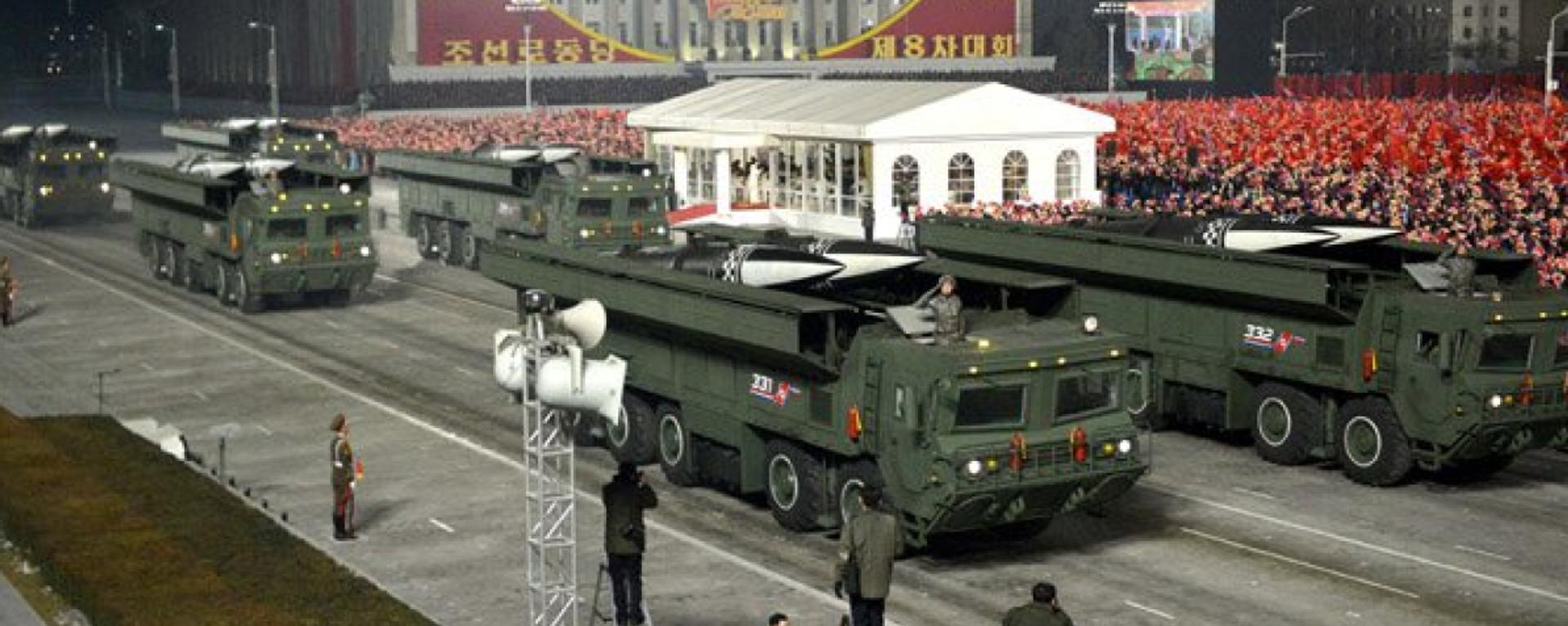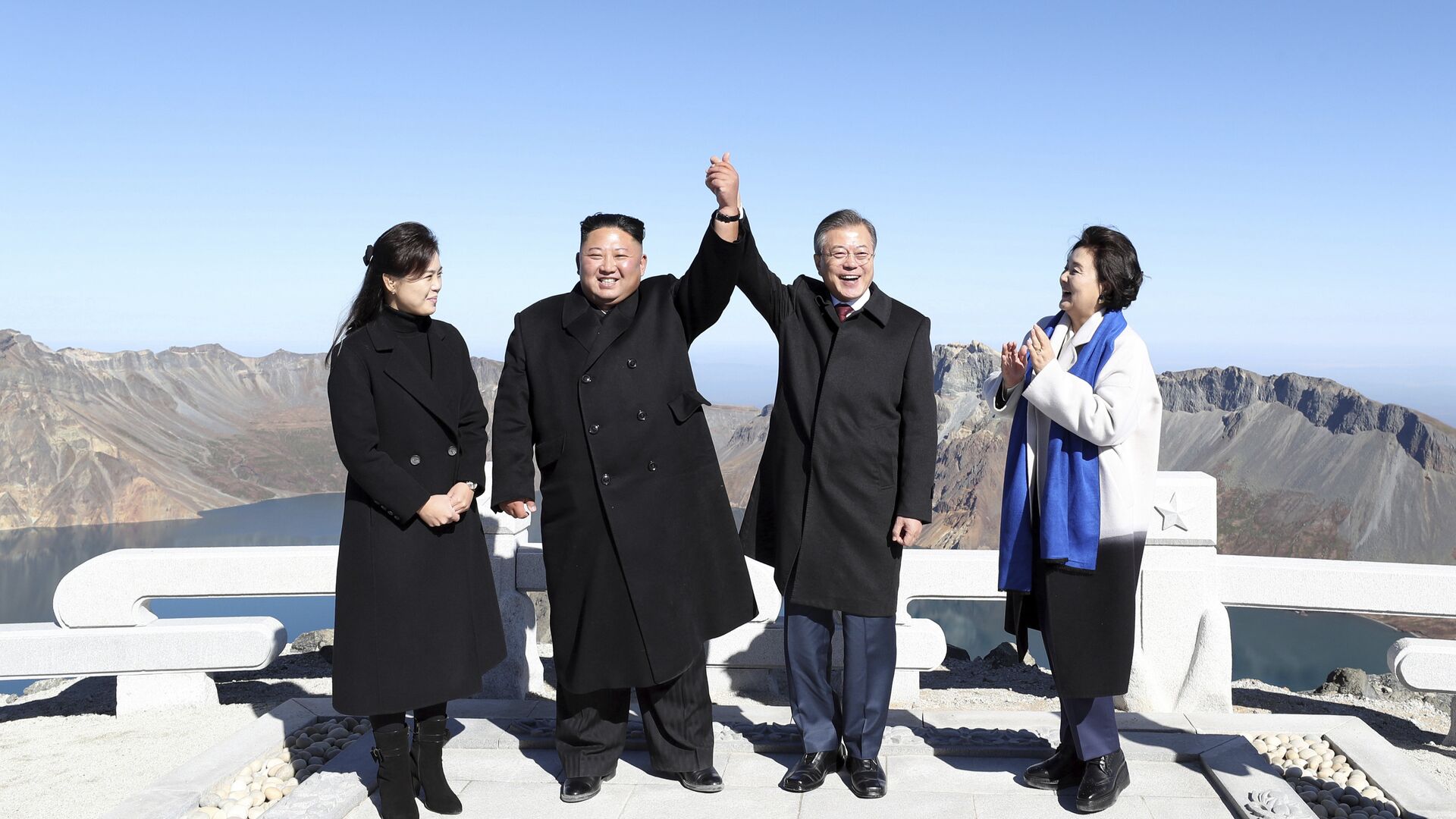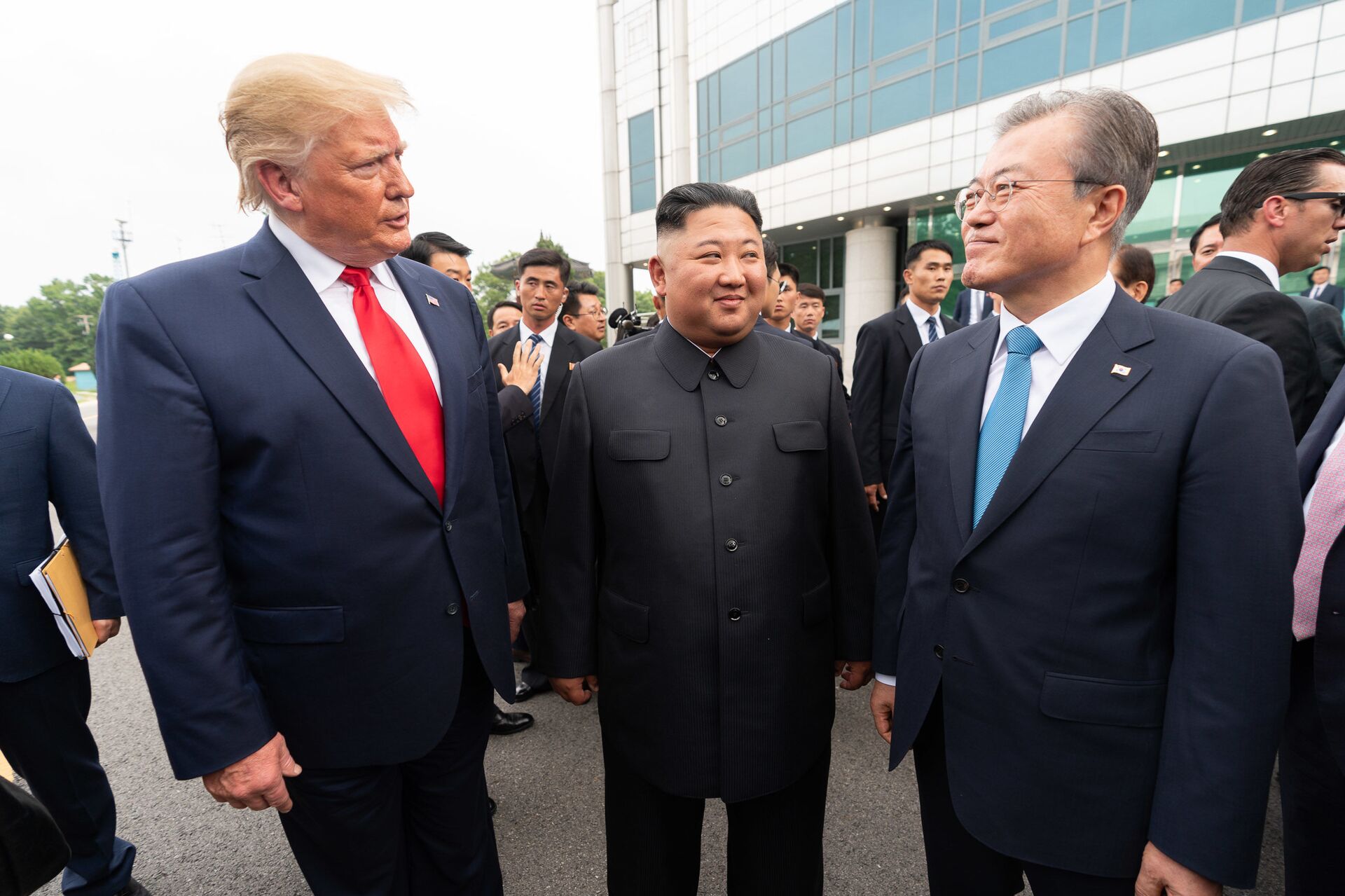https://sputnikglobe.com/20221009/what-happens-if-seoul-rips-up-historic-2018-inter-korean-military-treaty-1101661648.html
What Happens if Seoul Rips Up Historic 2018 Inter-Korean Military Treaty?
What Happens if Seoul Rips Up Historic 2018 Inter-Korean Military Treaty?
Sputnik International
Tensions on the Korean Peninsula have escalated dramatically over the past two weeks, with the Democratic People’s Republic of Korea (DPRK) conducting more... 09.10.2022, Sputnik International
2022-10-09T19:25+0000
2022-10-09T19:25+0000
2023-09-18T13:36+0000
sputnik explains
south korea
tensions
agreement
us
north korea
https://cdn1.img.sputnikglobe.com/img/106819/05/1068190506_0:87:4000:2337_1920x0_80_0_0_52927a7bee2aad5e1c60733298c59424.jpg
The office of South Korean President Yoon Suk-yeol and senior lawmakers from the country's ruling People Power party have warned that Seoul may rip up the 2018 Inter-Korean military agreement if Pyongyang proceeds with nuclear weapons testing.Threats to scrap the 2018 treaty come amid growing concerns among US and South Korean officials and media that Pyongyang is preparing for new nuclear testing. The country conducted its last nuclear bomb test in 2017.What is the 9.19 Agreement?The Inter-Korean Comprehensive Military Agreement, reached during an unprecedented thaw in relations between Pyongyang and Seoul in the late 2010s, was signed on September 19, 2018 by North Korean leader Kim Jong-un and then-South Korean President Moon Jae-in.The treaty led to the establishment of a 5 km buffer zone between the countries in which large-scale military drills and artillery fire exercises were prohibited, and set up 40 and 20 km no-fly zones extending out to the east and west from the Military Demarcation Line land border, respectively.Both sides committed to cease all “hostile military acts” along the border area, and broader agreements on reconciliation, non-aggression, exchanges and cooperation were facilitated. The treaty led to the removal of landmines near the Demilitarized Zone, the dismantling of guard posts at the Joint Security Area border, and helped to facilitate negotiations on the restoration of economic, health, sporting, and other ties.What Happens If Landmark Treaty is ScrappedAlexander Vorontsov, the head of the Department of Korea and Mongolia at the Russian Academy of Sciences’ Institute of Oriental Studies, says terminating the 9.19 treaty would have dramatic repercussions for inter-Korean relations and regional security as a whole, and destroy one of the only agreements in Korea's post-war history which committed both sides to practical measures to reduce tensions and engage in reconciliation.“Therefore, it’s not clear what goal the forces opposing the Inter-Korean agreement hope to achieve,” the academic said.If the agreement is scrapped, military tensions will inevitably increase, and years of painstaking diplomatic efforts by Presidents Moon and Kim will be destroyed in the process, Vorontsov fears.Vorontsov stressed that the current cycle of escalatory behavior – North Korean missile testing on one hand and South Korean military drills with allies on the other, won’t make things easier for either side.The Biden administration’s false promises of readiness to meet with Kim 'without preconditions', all while continuing to try to “suffocate” Pyongyang with sanctions has not helped matters, the expert emphasized, pointing out that the past year-and-a-half has seen the collapse of the Trump-era balance, which saw a halt in North Korean missile testing, and a freeze in US joint drills with South Korea.“Therefore, in January, Pyongyang lifted its voluntary moratorium on the testing of nuclear [weapons], although such tests have not yet taken place. But it seems that the US and South Korea are impatiently awaiting them with enviable tenacity, thereby openly provoking Pyongyang into holding them,” Vorontsov said.The observer pointed out that previous expectations by Seoul and Washington - that Pyongyang could conduct a nuclear test during Yoon's inauguration, or during Biden's visit to South Korea, have not borne out. “That is, the North does nothing, but the escalation in the information space constantly rises anyway,” Vorontsev concluded.
https://sputnikglobe.com/20221008/north-korea-may-launch-missile-test-nukes-next-week-1101641963.html
https://sputnikglobe.com/20221008/dprk-defends-righteous-missile-tests-as-response-to-us-threats-1101636526.html
south korea
north korea
Sputnik International
feedback@sputniknews.com
+74956456601
MIA „Rossiya Segodnya“
2022
News
en_EN
Sputnik International
feedback@sputniknews.com
+74956456601
MIA „Rossiya Segodnya“
Sputnik International
feedback@sputniknews.com
+74956456601
MIA „Rossiya Segodnya“
sputnik explains, south korea, tensions, agreement, us, north korea
sputnik explains, south korea, tensions, agreement, us, north korea
What Happens if Seoul Rips Up Historic 2018 Inter-Korean Military Treaty?
19:25 GMT 09.10.2022 (Updated: 13:36 GMT 18.09.2023) Tensions on the Korean Peninsula have escalated dramatically over the past two weeks, with the Democratic People’s Republic of Korea (DPRK) conducting more than half-a-dozen ballistic missile tests in response to a series of large-scale military drills between South Korea, the US and Japan.
The office of South Korean President Yoon Suk-yeol and senior lawmakers from the country's ruling People Power party have warned that Seoul may rip up the 2018 Inter-Korean military agreement if Pyongyang proceeds with nuclear weapons testing.
“If the 9.19 agreement is discarded, our military’s front line airspace for manned and unmanned aircraft, as well as the range of training areas along both coasts, will be expanded. This will bolster South Korea’s capabilities to surveil North Korea and increase our deterrence firepower,” People Power interim leader and Deputy National Assembly Speaker Chung Jin-suk wrote in a social media post Friday.
Threats to scrap the 2018 treaty come amid growing concerns among US and South Korean officials and media that Pyongyang is preparing for new nuclear testing. The country conducted its last nuclear bomb test in 2017.

8 October 2022, 16:22 GMT
What is the 9.19 Agreement?
The Inter-Korean Comprehensive Military Agreement, reached during an unprecedented thaw in relations between Pyongyang and Seoul in the late 2010s, was signed on September 19, 2018 by North Korean leader Kim Jong-un and then-South Korean President Moon Jae-in.
The treaty led to the establishment of a 5 km buffer zone between the countries in which large-scale military drills and artillery fire exercises were prohibited, and set up 40 and 20 km no-fly zones extending out to the east and west from the Military Demarcation Line land border, respectively.
Both sides committed to cease all “hostile military acts” along the border area, and broader agreements on reconciliation, non-aggression, exchanges and cooperation were facilitated. The treaty led to the removal of landmines near the Demilitarized Zone, the dismantling of guard posts at the Joint Security Area border, and helped to facilitate negotiations on the restoration of economic, health, sporting, and other ties.
What Happens If Landmark Treaty is Scrapped
Alexander Vorontsov, the head of the Department of Korea and Mongolia at the Russian Academy of Sciences’ Institute of Oriental Studies, says terminating the 9.19 treaty would have dramatic repercussions for inter-Korean relations and regional security as a whole, and destroy one of the only agreements in Korea's post-war history which committed both sides to practical measures to reduce tensions and engage in reconciliation.
“The inter-Korean agreement is an extremely useful document that makes it possible to strengthen confidence-building measures between the South and the North, including in the Demilitarized Zone. However, the right-wing forces in the ROK are now opposed to it, even though such opposition does not strengthen Seoul’s security in the slightest. On the contrary, it leads to retaliatory steps by Pyongyang and a resumption of tensions,” Vorontsov told Sputnik in an interview.
“Therefore, it’s not clear what goal the forces opposing the Inter-Korean agreement hope to achieve,” the academic said.
If the agreement is scrapped, military tensions will inevitably increase, and years of painstaking diplomatic efforts by Presidents Moon and Kim will be destroyed in the process, Vorontsov fears.
The specialist stressed that the 2018 treaty played a major and concrete role in improving the security situation on the Korean Peninsula, since it meant practical measures in the military sphere, something that “happens extremely rarely” in such agreements. He emphasized that real practical steps aimed at reaching an Inter-Korean settlement following the war of 1950-1953 can “literally be counted on one hand,” with previous agreements largely limited to intentions and declarations which did not commit either party to any concrete measures.
Vorontsov stressed that the current cycle of escalatory behavior – North Korean missile testing on one hand and South Korean military drills with allies on the other, won’t make things easier for either side.

8 October 2022, 11:37 GMT
The Biden administration’s false promises of readiness to meet with Kim 'without preconditions', all while continuing to try to “suffocate” Pyongyang with sanctions has not helped matters, the expert emphasized, pointing out that the past year-and-a-half has seen the collapse of the Trump-era balance, which saw a halt in North Korean missile testing, and a freeze in US joint drills with South Korea.
“Therefore, in January, Pyongyang lifted its voluntary moratorium on the testing of nuclear [weapons], although such tests have not yet taken place. But it seems that the US and South Korea are impatiently awaiting them with enviable tenacity, thereby openly provoking Pyongyang into holding them,” Vorontsov said.
The observer pointed out that previous expectations by Seoul and Washington - that Pyongyang could conduct a nuclear test during Yoon's inauguration, or during Biden's visit to South Korea, have not borne out. “That is, the North does nothing, but the escalation in the information space constantly rises anyway,” Vorontsev concluded.




